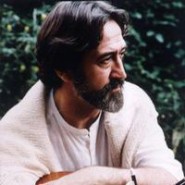Jordi Savall歌手简介:
西班牙大提琴家、维奥尔琴演奏家、指挥。1941年出生于巴塞罗那(Barcelona)。六岁开始学习音乐。1959-1965年在巴塞罗那音乐学院学习大提琴。此后放弃大提琴,改学早期音乐,1968年在瑞士巴塞尔(Basel)的知名早期音乐学府 Schola Cantorum Basiliensis ,随温辛格(August Wenziger)学习低音维奥尔琴(Viola da Gamba)。1970年毕业,成为独奏艺术家,并开始录制唱片。1973年继他的老师温辛格成为母校的教授。1974年,他与他的妻子、女高音歌唱家菲格拉斯(Montserrat Figueras)以及其他一些朋友,共同创建了乐队 Hespérion XX,专门演奏中世纪、文艺复兴时期及巴洛克时期的音乐作品,受到音乐界高度评价。在瑞士生活了20年后,他于1987年回到巴塞罗那,创建了 La Capella Reial de Catalunya 乐团,一支专注于1800年以前声乐作品的乐团。1989年,他又创建了巴洛克和古典乐团国家协奏团(Le Concert des Nations)。
萨瓦利是公认的优秀低音维奥尔琴的演奏家和早期音乐阐释者。他以极大的热情投入音乐会演奏和指挥,录制过100多张唱片,获得过许多大奖。1988年,他被法国文化部指定为文化艺术奖(Ordre des Arts et des Lettres)的负责人。
Jordi Savall is among the leading instrumentalists and conductors of the European early music scene, specializing in Renaissance and Medieval music. He began studying music when he was six, learning cello and pursuing that instrument at the Barcelona Conservatory. He took an interest in early music, and began learning the viola da gamba. Savall also gained proficiency in the various members of the viola family. He studied the gamba and early music research and practice with Wieland Kuijken in Brussels and August Wenziger at the Schola Cantorum Basiliensis in Basel, obtaining a diploma as soloist and professor in 1970. In 1973 he succeeded to Wenziger's position.
In 1968 Savall married the soprano Montserrat Figueras, who shared his interest in early music. With Figueras and other musicians interested in early Spanish music, he founded in 1974 the ensemble Hespèrion XX. The ensemble took its name from an ancient name for the western European region from Italy to Iberia; Hespèrion was also a name for Venus as the Evening Star (in which aspect it appears only in the western skies).
Savall and Hespèrion XX quickly became well known in early music circles. They created a unique sound through the use of viols and other Medieval instruments such as the psaltery, wooden flutes, Moroccan drums, and the Afghan rebec (a double reed ancestor of the oboe). All these instrument are known to have been used by Medieval musicians, particularly in the Mediterranean region.
Savall became internationally known through his playing on the soundtrack of Alain Corneau's film Tous les Matins du Monde (All the Mornings of the World), concerning the French viol players of the Baroque era. Savall has extended his area of musical interest into the Baroque, leading performances of Orfeo by Monteverdi and Il burbero de Buion Cuore by Martin y Soler, and in the late 1990s conducted Beethoven's "Eroica" Symphony with Les Concerts des Nations (a group he founded in 1989 for Baroque music), winning praise for his well-researched and groundbreaking interpretation. He also founded Le Capella Reial de Catalunya in 1987, an ensemble of instrumentalists and vocal soloists.
Savall has recorded around 100 releases. To 1996, most of Savall's recordings appeared on the Astrée Auvidis label, but this legacy became part of Naïve after Astrée was sold to them in 2001. In 1996, Savall introduced his own AliaVox label with a disc of Juan Cabanilles that has served as the platform for his recordings ever since. Savall has also taken advantage of his celebrity through traveling as a touring artist throughout the world with all three of his actively performing groups.

